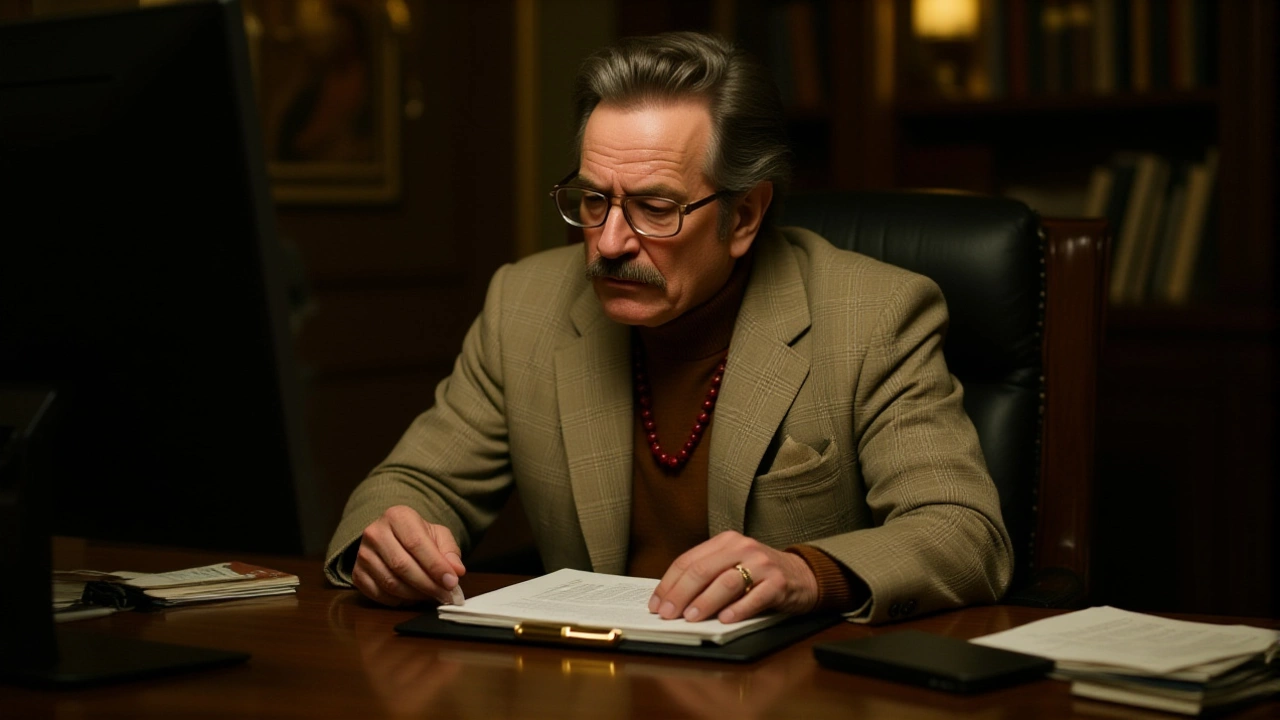
When Bryan Cranston, Actor of Apple TV+ took the stage at the Television Academy’s Televerse festival on Aug. 16, 2025, he made a point of killing a rumor that had been buzzing the corridor between studios and cafés alike.
Addressing a room of roughly 350 execs, producers and critics in the Academy’s Saban Media Center in North Hollywood, the 69‑year‑old star said flat‑out that his character Griffin Mills was not a caricature of Warner Bros. Discovery CEO David Zaslav, CEO of Warner Bros. Discovery. “I did a deep dive on him and thought, ‘Well, he’s so boring.’ There’s nothing funny about David,” Cranston told the audience, a line that sparked laughs and a few puzzled looks.
Background: The Show and Its Satirical Edge
Created by Seth Rogen and James Weaver, The Studio debuted on Apple TV+ on March 1, 2025. The ten‑episode satire lampoons the modern studio system, juxtaposing the old‑school power plays of the golden‑age moguls with today’s streaming battles. Each 28‑minute episode was produced on a $5.2 million budget, bringing the season total to $52 million – a figure disclosed to the California Film Commission on Jan. 12, 2025.
- Premiere: March 1, 2025 (Apple TV+)
- Episodes: 10 (≈28 min each)
- Budget: $5.2 million per episode
- Emmy Nods: 14 nominations including Outstanding Comedy Series
- Main Cast: Kathryn Hahn, Dave Franco, Chase Sui Wonders
The show’s tone is unapologetically Hollywood satire, and Cranston’s turn as the self‑important, morally elastic studio chief Griffin Mills has become its centerpiece.
Cranston’s Clarification at Televerse
During the 90‑minute panel, moderated by Television Academy CEO Cris Abrego, Cranston was asked directly whether Zaslav served as his muse. He replied that the research into Zaslav’s leadership was “boring” and therefore “not funny enough for a comedy.” The actor emphasized that the character was a product of the writers’ imagination, not a thinly veiled jab at any living executive.
He added later, in a one‑on‑one interview with Gold Derby’s senior editor Daniel Montgomery at the Beverly Hills Hotel on Aug. 17, that the notion of basing the role on Zaslav was a “media myth.” Cranston noted the series’ creators – Rogen, Weaver, and co‑creator Evan Goldberg – gave him a “composite” of historical studio heads rather than a snapshot of any current CEO.
Inspiration from Robert Evans and Hollywood’s Golden Age
The missing piece of the puzzle came when Cranston cited the 2002 audiobook memoir The Kid Stays in the Picture as his main source of inspiration. The memoir recounts the life of Robert Evans, the flamboyant Paramount Pictures boss who ran the studio from 1966 to 1999 and helped green‑light classics like The Godfather, Chinatown and Rosemary’s Baby. “Evans was larger‑than‑life, a bit reckless, and undeniably charismatic,” Cranston explained. “Griffin Mills is a love‑letter to that era’s power brokers, not a snarl at today’s tech‑savvy CEOs.”
He described Mills as “strange, self‑important, and often morally questionable,” qualities that echo tales of studio legends who could make or break a career with a single phone call. By anchoring the character in that nostalgic mold, the show taps into a cultural memory that even younger viewers recognize as the archetype of the Hollywood king‑maker.
Why the Misfire?
Industry watchers initially linked the role to Zaslav because Warner Bros. Discovery’s 2022 merger created a media behemoth that, like the fictional studio, wrestles with the streaming‑vs‑theatrical debate. The visual similarity – a suit‑clad executive with a sharp jawline – only fed speculation. Cranston’s outright denial helped steer the conversation back to the show’s intended satire of power, not a personal jab.

Industry Reactions and What It Means for the Series
After the panel, social media lit up. Tweets from entertainment journalists praised Cranston for “setting the record straight” while others wondered if the clarification might dampen the buzz that has helped the series climb the Apple TV+ charts.
Nonetheless, the Emmy buzz remains strong. The series currently holds a 94 % approval rating on Rotten Tomatoes, and the lead‑in nominations have spurred a surge in viewership, with Apple reporting a 12 % uptick in weekly viewers during the week of the Televerse event.
Critics also note that the show’s willingness to poke fun at real‑world media conglomerates — without naming them directly — could invite legal scrutiny. However, media lawyers quoted by The Hollywood Reporter say that because the character is a “fictional composite,” the risk is low.
Future Outlook for ‘The Studio’ and Satire in Streaming
Apple TV+ has already confirmed a second season is in early development, with Cranston slated to return. The network sees the series as a flagship comedy that can rival the sharpness of HBO’s “Succession” while offering a lighter, more comedic tone.
As streaming platforms continue to clamp down on traditional studio power, shows like The Studio provide a reflective, and sometimes uncomfortable, mirror. Cranston’s clarification that the satire draws from Hollywood’s past, not a present‑day CEO, reinforces the show’s broader mission: to remind us that the battle for content has always been as much about personalities as about platforms.
Frequently Asked Questions
Why did Bryan Cranston feel the need to address the Zaslav rumor?
The speculation that Griffin Mills was a thinly veiled parody of Warner Bros. Discovery CEO David Zaslav had been circulating in trade press since the series premiered. Cranston wanted to clarify the creative intent and prevent the story from becoming a distraction from the show’s broader satire of Hollywood power dynamics.
What real‑life figure actually inspired Cranston’s performance?
Cranston cited the 2002 memoir The Kid Stays in the Picture, which chronicles the life of former Paramount Pictures head Robert Evans. Evans’ larger‑than‑life personality, risky decision‑making, and iconic film legacy served as the primary template for Griffin Mills.
How has the series performed commercially and critically?
The Studio debuted to strong numbers on Apple TV+, pulling in roughly 2.4 million households in its first month. It holds a 94 % Rotten Tomatoes score and has earned 14 Primetime Emmy nominations, including Outstanding Comedy Series and Outstanding Lead Actor for Cranston.
Will the clarification affect future storylines?
The show’s creators confirmed that season two will continue exploring the clash between legacy studios and streaming giants, but they will stay clear of direct analogues to current CEOs. Instead, they plan to broaden the satire to include global media conglomerates and emerging tech platforms.
What does this incident reveal about the relationship between Hollywood and streaming services?
It underscores how tightly intertwined narrative content and corporate perception have become. As streaming services like Apple TV+ become major content financiers, creators walk a fine line between lampooning industry practices and avoiding potential legal pushback from the very companies that fund their projects.
